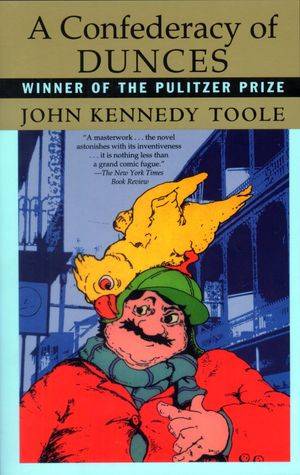

A Confederacy of Dunces
by Walker Percy and John Kennedy Toole
"A green hunting cap squeezed the top of the fleshy balloon of a head. The green earflaps, full of large ears and uncut hair and the fine bristles that grew in the ears themselves, stuck out on either side like turn signals indicating two directions at once. Full, pursed lips protruded beneath the bushy black moustache and, at their corners, sank into little folds filled with disapproval and potato chip crumbs."Meet Ignatius J. Reilly, the hero of John Kennedy Toole's tragicomic tale, A Confederacy of Dunces. This 30-year-old medievalist lives at home with his mother in New Orleans, pens his magnum opus on Big Chief writing pads he keeps hidden under his bed, and relays to anyone who will listen the traumatic experience he once had on a Greyhound Scenicruiser bound for Baton Rouge. ("Speeding along in that bus was like hurtling into the abyss.") But Ignatius's quiet life of tyrannizing his mother and writing his endless comparative history screeches to a halt when he is almost arrested by the overeager Patrolman Mancuso--who mistakes him for a vagrant--and then involved in a car accident with his tipsy mother behind the wheel. One thing leads to another, and before he knows it, Ignatius is out pounding the pavement in search of a job.Over the next several hundred pages, our hero stumbles from one adventure to the next. His stint as a hotdog vendor is less than successful, and he soon turns his employers at the Levy Pants Company on their heads. Ignatius's path through the working world is populated by marvelous secondary characters: the stripper Darlene and her talented cockatoo; the septuagenarian secretary Miss Trixie, whose desperate attempts to retire are constantly, comically thwarted; gay blade Dorian Greene; sinister Miss Lee, proprietor of the Night of Joy nightclub; and Myrna Minkoff, the girl Ignatius loves to hate. The many subplots that weave through A Confederacy of Dunces are as complicated as anything you'll find in a Dickens novel, and just as beautifully tied together in the end. But it is Ignatius--selfish, domineering, and deluded, tragic and comic and larger than life--who carries the story. He is a modern-day Quixote beset by giants of the modern age. His fragility cracks the shell of comic bluster, revealing a deep streak of melancholy beneath the antic humor. John Kennedy Toole committed suicide in 1969 and never saw the publication of his novel. Ignatius Reilly is what he left behind, a fitting memorial to a talented and tormented life.
Release Date:
December 31, 1993

